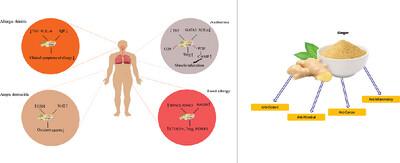当前位置:
X-MOL 学术
›
Mol. Nutr. Food Res.
›
论文详情
Our official English website, www.x-mol.net, welcomes your
feedback! (Note: you will need to create a separate account there.)
Ameliorative Effects of Ginger on Allergic Diseases: An Updated Review
Molecular Nutrition & Food Research ( IF 4.5 ) Pub Date : 2024-10-02 , DOI: 10.1002/mnfr.202300899 Mohammad Khaki Vaighan, Mohammad Hossein Shams, Fatemeh Tatari, Reza Jafari, Seyyed Mohsen Sohrabi, Nahid Eskandari, Mohsen Mohammadi
Molecular Nutrition & Food Research ( IF 4.5 ) Pub Date : 2024-10-02 , DOI: 10.1002/mnfr.202300899 Mohammad Khaki Vaighan, Mohammad Hossein Shams, Fatemeh Tatari, Reza Jafari, Seyyed Mohsen Sohrabi, Nahid Eskandari, Mohsen Mohammadi

|
The hypersensitivity reaction of the immune system to harmless environmental substances causes allergic diseases. Today, about 22%–30% of the world's population suffers from allergic diseases. Since the probability of change in the genetic structure during the past decades of lives is very low, genetic disorders cannot be blamed for causing allergic diseases. Thus, factors such as air pollution, climate change, change in diet, increased antibiotics consumption, change in the gut microbiome, migration toward urban areas, and increase in airborne allergens should be considered as the main causes of the spread and increase in allergic diseases. Methods of preventing contact with allergens, drug treatment, and allergen-specific immunotherapy are used to treat allergic diseases. In recent years, the therapeutic efficacy of herbal compounds has been significantly investigated by the scientific community, because these compounds have very few side effects. Ginger is one of the plant compounds that have anti-inflammatory, antioxidant, and immunomodulatory properties. The ameliorative effects of this plant on allergic diseases have been identified. Therefore, the aim of this short review is to summarize the knowledge, which is available about the ameliorative properties of the compounds found in the ginger plant that can reduce the clinical symptoms of allergic diseases.
中文翻译:

生姜对过敏性疾病的改善作用:更新综述
免疫系统对无害环境物质的超敏反应会导致过敏性疾病。今天,世界上约有 22%-30% 的人口患有过敏性疾病。由于在过去几十年的生命中遗传结构发生变化的可能性非常低,因此不能将导致过敏性疾病归咎于遗传疾病。因此,空气污染、气候变化、饮食改变、抗生素消耗增加、肠道微生物组的变化、向城市地区的迁移以及空气传播过敏原的增加等因素应被视为过敏性疾病传播和增加的主要原因。预防接触过敏原的方法、药物治疗和过敏原特异性免疫疗法用于治疗过敏性疾病。近年来,科学界对草药化合物的治疗效果进行了重大研究,因为这些化合物的副作用非常小。生姜是具有抗炎、抗氧化和免疫调节特性的植物化合物之一。已经确定了这种植物对过敏性疾病的改善作用。因此,这篇简短的综述的目的是总结现有的有关生姜植物中发现的化合物的改善特性的知识,这些化合物可以减少过敏性疾病的临床症状。
更新日期:2024-10-02
中文翻译:

生姜对过敏性疾病的改善作用:更新综述
免疫系统对无害环境物质的超敏反应会导致过敏性疾病。今天,世界上约有 22%-30% 的人口患有过敏性疾病。由于在过去几十年的生命中遗传结构发生变化的可能性非常低,因此不能将导致过敏性疾病归咎于遗传疾病。因此,空气污染、气候变化、饮食改变、抗生素消耗增加、肠道微生物组的变化、向城市地区的迁移以及空气传播过敏原的增加等因素应被视为过敏性疾病传播和增加的主要原因。预防接触过敏原的方法、药物治疗和过敏原特异性免疫疗法用于治疗过敏性疾病。近年来,科学界对草药化合物的治疗效果进行了重大研究,因为这些化合物的副作用非常小。生姜是具有抗炎、抗氧化和免疫调节特性的植物化合物之一。已经确定了这种植物对过敏性疾病的改善作用。因此,这篇简短的综述的目的是总结现有的有关生姜植物中发现的化合物的改善特性的知识,这些化合物可以减少过敏性疾病的临床症状。






























 京公网安备 11010802027423号
京公网安备 11010802027423号